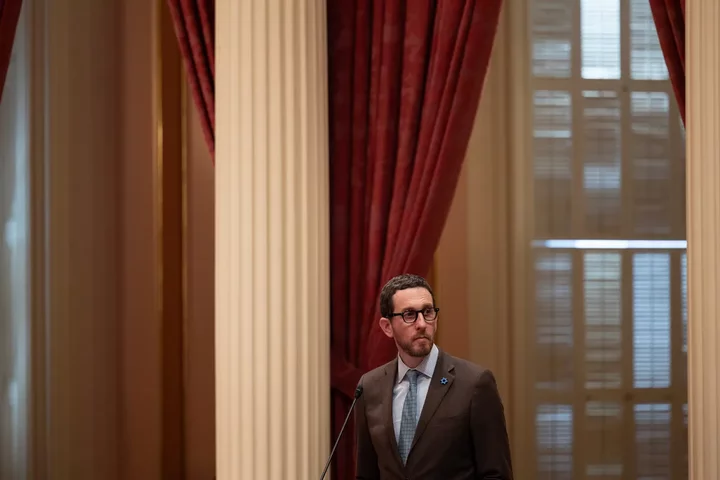State Sen. Scott Wiener on the Senate Floor at the state Capitol in Sacramento on April 29, 2024. Photo by Miguel Gutierrez Jr., CalMatters
Lawmakers and advocates say Gov. Gavin Newsom’s administration is making inflated estimates about the cost of legislation, with some suggesting his subordinates have been trying to kill the bills without making the governor politically accountable for the outcome.
“While people are dying on the streets from a lack of access to behavioral health care treatment, state agencies continue to fabricate exorbitant cost estimates,” Sen. Dave Cortese, a Democrat from Campbell, told CalMatters after one of his mental health proposals died recently in the Assembly Appropriations Committee.
Sen. Scott Wiener, a Democrat from San Francisco who authored another mental health bill that died recently, said in a public hearing last month that the administration’s cost estimate of his bill was “extreme and outrageous.”
The pointed accusations from Democratic lawmakers and health care advocates who tend to be friendly with the Democratic governor are extraordinary because such criticism is rarely made in public. The examples also stand out because they challenge the administration’s response on one of the governor’s top priorities, mental health.
The administration did not accept an interview request with CalMatters and would not provide more detail – to CalMatters or to lawmakers – to explain the cost estimates. By email, however, a spokesperson insisted the costs were accurate and rejected the idea that they were intentionally inflated.
“It’s outrageous and inaccurate for anyone to suggest these numbers are fabricated or artificially inflated,” Rodger Butler, a spokesperson for Newsom’s Health and Human Services Agency, said in an email. “Legislative fiscal analyses from state government departments are informed by real-world, on-the-ground experience implementing legislative mandates.”
Whatever the motivations, four health care bills with controversial cost estimates died quietly earlier this month in the Senate and Assembly Appropriations committees even after each had advanced without a single “no” vote from a Democratic legislator.

Assembly lawmakers meet during a Suspense File hearing at the Capitol Annex Swing Space in Sacramento, on Aug. 15, 2024. Photo by Fred Greaves for CalMatters
The Appropriations Committees are focused on the cost of legislation, especially in a year when the state is struggling with a budget deficit. The four bills were moved to the committees’ “suspense files” along with 263 other controversial or costly bills. Each committee then killed the bills in their respective suspense file with a single vote.
Mike Gatto, a former Democratic lawmaker from Los Angeles who chaired the Assembly Appropriations Committee, said inflated cost estimates from a governor’s administration are nothing new.
When an executive-branch agency provides “a significantly exaggerated cost” on a piece of legislation “it’s generally a big flashing light that the administration dislikes the bill and that the governor would likely veto it,” he said.
It can be advantageous for the governor when legislators quietly kill those bills, he said.
“Having the appropriations committee there to kill it and to take the arrows (of criticism), that is a tremendous benefit politically for any governor,” Gatto said.
Gatto has a hand-written note framed on his wall that former Gov. Jerry Brown gave him expressing Brown’s appreciation for keeping bills from reaching the governor’s desk.
In a corner of the note are two words: “Keep holding.”
But Thad Kousser, a former legislative staffer who’s now a professor of political science at UC San Diego, said the integrity of the legislative process is jeopardized if cost estimates are not accurate.
“You’ve got to have reasonable and realistic estimates that are not part of a political strategy in order for everyone to make informed decisions,” he said.
This year alone, according to the Digital Democracy database, lawmakers considered 2,522 bills, many of them with large potential costs to taxpayers.
Democrat calls costs ‘extreme and outrageous’
Sen. Wiener’s legislation, Senate Bill 294, would have required an automatic review of cases in which commercial health plans denied children and young people mental health treatment.
Wiener, the chair of the Senate’s mental health caucus, said in the public hearing last month that the measure “does nothing more than require health plans to provide the coverage that they’re required to provide and stop denying covered behavioral health care treatment to children.”
So he said it was “outrageous” when the Department of Managed Health Care estimated that the bill would cost $87.6 million per year by 2028 and would require 340 new employees. That’s a 55% increase over the 610 positions in the department’s budget for the 2022-23 fiscal year. A separate state office, the Department of Insurance, also said the bill would require it to hire an additional five positions by 2026 for $1.2 million. There is no description in the cost estimate about how the departments arrived at the estimate or what jobs the new positions would perform.
###
CalMatters.org is a nonprofit, nonpartisan media venture explaining California policies and politics.

CLICK TO MANAGE